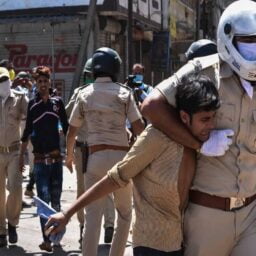INTRODUCTION
As new variants of SARS-CoV-2 are emerging day by day, there is an immediate need for herd immunity for preventing the outbreak. The latest variant reported as of 26 November 2021 is variant B.1.1.529 a variant of concern also referred to as the omicron variant[1]. It is a general observation that vaccine hesitancy is prevalent among people that make us ponder upon the most challenging question of the decade that whether vaccines should be made compulsory by the central authorities, and whether public interest ride over the individual fundamental right.
HISTORY
The legislation of vaccination in India can be traced back to the British era when the smallpox epidemic took place and the Government passed the Compulsory Vaccination Act of 1892. [2]According to the reports, 80% of British India was covered under this act in 1938. The Government of India Act of 1919 has given the responsibility to the local self Government for providing smallpox vaccination.[3]
Smallpox eradication left a legacy for improving the health system, more research on vaccine-preventable diseases and training of adequate health professionals in times of outbreaks.
The Epidemic Diseases Act, 1897 is a major milestone for the development of disease controlling vaccines and preventing outbreaks. Section 2 of this Act empowers the State Government/UT’S to take special measures and formulate regulations for containing the pandemic. It also invests such powers in the authorities that they can prescribe temporary regulation to be observed by the public as seem necessary to prevent the pandemic.
Section 3 also provides for penalties for non-compliance with the rules and regulations under the act for controlling the outbreaks.
The Disaster Management Act, 2005 also provides ample evidence of the fact that the Central Government can under Section 62 issue directions to State Governments, Ministers, and Departments to assist in the disaster management and make vaccination compulsory for the necessary time being.
Is Forceful Vaccination A Violation of the Fundamental Rights?
The Decision of the Meghalaya High Court comes in handy in this context when the court opinioned in Register General, High Court of Meghalaya Vs State of Meghalaya that forceful vaccination is unconstitutional. This decision comes in the light of debate when the deputy commissioner of Meghalaya made it necessary that taxi drivers, shopkeepers and other businessmen had to be vaccinated before resuming their businesses. The Court has relied on the English Case of Airedale NHS Trust v. Bland where it was held that forceful vaccination against the will of the person is a tort/Civil wrong. A similar viewpoint is also shared by the Union Health Minister that vaccines cannot be made compulsory.
The Right to Health is a fundamental right that forms an integral point of The Right to Life under Article 21 of the Constitution was first recognized by the Apex Court in Consumer Education and Research Centre Vs Union of India. If however the individual is not given enough freedom to exercise this right, this would defeat the entire purpose of this fundamental right. This can be analyzed from the conduct of health workers when they force people to take a jab against Covid-19.
The Right to Privacy observed from the K.S Puttaswamy Vs Union of India case also recognizes an individual’s right to Body autonomy and health decisions. The State Legislation of Compulsory Vaccination would be excessive and coercive as it would violate an Individual’s Right to Privacy and Right to Life under Article 21 by not letting them exercise Body Autonomy and integrity.
Another Important standpoint that needs to be considered here is that the Central Government has made Vaccination entirely voluntary but time and again the State Governments are making provisions to make Vaccination Compulsory which goes against the directions issued by the Central Government.[4]
WHY THE VACCINES SHOULD BE MADE COMPULSORY?
The Argument which has been raised in supporting the contention of making vaccines compulsory is that the Health of the public ride over the Right of Individuals. Further, the Right to Privacy is not an absolute right and can be restricted subject to public order, health, and morality. The Individual by not taking the jab is not only endangering his life but also of other people by spreading the disease. If we want to return to the pre-Covid-19 era vaccines had to be administered and coercive behaviour is justified when it’s for the public benefit.
While at the beginning of the inoculation of vaccines there were disruptions in the supply of vaccines, but now we cannot ignore the fact that the demand problem exists too which results in the wastage of vaccines. In wake of the low percentage of people vaccinated, Austria has announced to make vaccines compulsory from 2022.
Vaccine hesitancy in the end will lead to more outbreaks, more deaths and leaving the marginalized section of the society vulnerable. It is also important that the ones who are administrating vaccines are not ‘disease spreaders’ and do not harm the people they come in contact with. It is also scientifically proved and observed over a span of time from administrating that vaccines are safe, and do not have any potential side effects.
More than 4.7 lakh people had died in India due to Covid-19 and mostly were composed of non-vaccinated people. If we want to achieve herd immunity against COVID-19 more and more people should be vaccinated.[5]
The Government has also restricted people from travelling abroad without being vaccinated, which is justifiable for public health and controlling outbreaks.
WHY COOPERATION IS THE WAY FORWARD?
The Government should be careful while formulating any policy which will force the people to take vaccines, and it should take such measures which will help to eradicate vaccine hesitancy. Recently, Facebook’s data for Good team analyzed thousands of public posts about vaccine hesitancy. Facebook’s COVID-19 Trends and Impact Survey (CITS) has tracked down the information on vaccine acceptance in over 200 countries. Approximately 29% showed hesitancy in taking vaccines and 12% don’t want to get vaccinated at all in India. The major reasons observed for not getting vaccinated are the ‘concern about side effects’’ and ‘’waiting for others to get it’’. There is a significant information gap between the health authorities and the people.
Filling this gap is necessary to build the trust of people in health authorities and our past vaccine immunization programs have also shown that when the Government wins the trust and confidence of the public administrating vaccines has become easier. To address this information gap, the Government can take the following measures:-
- The Government needs to spread awareness by making credible data and information available to the public.
- Promoting Frontline workers to reduce gender gaps as women are more reluctant to be vaccinated than men because of misinformation about vaccines causing infertility and the disturbing menstrual cycle needs to be addressed. The Asha workers will be able to educate women and the marginalized society at the ground level.
- Promoting social media for vaccine campaigns, better connectivity to a rural area and more internet penetration is required.[6]
A significant drawback of making vaccines compulsory will be that the well-being people of the society will be in a better position to access vaccines due to better connectivity to vaccine centres thus leaving the marginalized people of the society behind.
It will also disrupt the supply chain pattern as there will be more demand than the supply for vaccines.
CONCLUSION
Trust in vaccines and the health system is important for administrating the vaccine program successfully. Lack of trust will give rise to vaccine refusal, misinformation, and disease outbreaks. However, this is not to imply that the Government shouldn’t make vaccines compulsory for some strata of the society like the healthcare workers, organizations where numerous people are employed and crowded workplaces. The healthcare workers especially need to be vaccinated so that they do not spread disease to the public. Various countries in the world like New Zealand, the USA, and Canada has made vaccines compulsory for their organization workers. The Government should act through cooperation and be careful in not infringing their rights while also filling the misinformation gaps and spreading awareness. But if the circumstance doesn’t improve, the government should not hesitate to make the vaccines compulsory for preventing the outbreak of disease.
Author(s) Name: Himanshi Garg (Panjab University, Chandigarh)
References:
[1] WHO, ‘Update on Omicron’ <https://www.who.int/news/item/28-11-2021-update-on-omicron> accessed on 11 December 2021
[2] Rangin Pallav Tripathi, ‘Indian Govt has multiple legal options to force citizens to vaccinate against Covid’ <https://theprint.in/opinion/indian-govt-has-legal-options-to-enforce-compulsory-covid-vaccination/411662/> accessed on 9 December 2021
[3] Chandrakant Lahariya, ‘A brief history of vaccines & vaccination in India’ <https://www.ncbi.nlm.nih.gov/pmc/articles/PMC4078488/> accessed on 10 December 2021
[4] Pushpit Singh, ‘Compulsory Vaccination for COVID-19: Legal Possibility or Violation of Fundamental Rights?’ <https://www.barandbench.com/apprentice-lawyer/compulsory-vaccination-for-covid-19-in-india-a-legal-possibility-or-a-violation-of-fundamental-rights> accessed on 11 December 2021
[5] Amir Ullah Khan, ‘State Must Not Drag Its Feet and Make Covid Vaccination Mandatory for All Adults’ <https://www.news18.com/news/opinion/state-must-not-drag-its-feet-make-covid-vaccination-mandatory-4526342.html> accessed on 10 December2021
[6] Kumar Das, Bijeta Mohanty, ‘The growing concerns around vaccine hesitancy in India’ <https://www.theigc.org/blog/the-growing-concerns-around-vaccine-hesitancy-in-india/> accessed on 11 December 2021
















